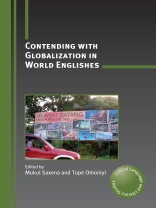This book engages with English in globalization, re-examining and re-interpreting the contemporary contexts of its acquisition and use. The chapters contained in this book weave together four inter-related themes that define the role of English in the global context: the ‘centrality of structure’, ‘relationships of interdependence’, ‘social constructions of difference’ and ‘reproduction of inequality’. These themes enable the authors to draw attention to the dynamics of the contemporary realities of the ‘English-speaking’ and ‘English-using’ nations, especially as they compete for cultural, social, economic and symbolic capital in global networks. In engaging World Englishes with the sociolinguistics of globalization, the authors raise some fundamental questions about the status, structure, and functions of World Englishes.
Daftar Isi
Chapter 1: Introduction – Tope Omoniyi and Mukul Saxena
Chapter 2: Globalization and International Intelligibility – Paroo Nihalani
Chapter 3: From Chaos to Order: Language Change, Lingua Francas & World Englishes – Phyllis Ghim-Lian Chew
Chapter 4: English as a Lingua Franca in the Global Context: Interconnectedness, Variation and Change – Martin Dewey & Jennifer Jenkins
Chapter 5: World Englishes, Globalization, and the Politics of Conformity – Rakesh M. Bhatt
Chapter 6: EFL: from You Sound Like Dickens to International English – Maria Georgieva
Chapter 7: Glocalization of English in World Englishes: An Emerging Variety among Persian Speakers of English – Farzad Sharifian
Chapter 8: Local Networks in the Formation and Development of West African English – Augustin Simo Bobda
Chapter 9: The English Language, Globalization and Latin America: Possible Lessons from the ‘Outer Circle’ – Kanavillil Rajagopalan
Chapter 10: Rethinking Origins and Localization in Global Englishes – Alastair Pennycook
Chapter 11: Final Reflections: Globalization and World Englishes – Mukul Saxena and Tope Omoniyi
Tentang Penulis
Tope Omoniyi is Professor of Sociolinguistics in the Department of Media, Culture and Language at the University of Roehampton. He is a member of the burgeoning Sociology of Language and Religion (SLR) international research network.












